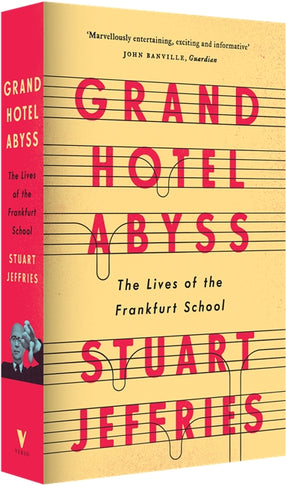Paperback
+ free ebook

+ free ebook
Who were the Frankfurt School — Benjamin, Adorno, Marcuse, Horkheimer — and why do they matter today?
In 1923, a group of young radical German thinkers and intellectuals came together to at Victoria Alle 7, Frankfurt, determined to explain the workings of the modern world. Among the most prominent members of what became the Frankfurt School were the philosophers Walter Benjamin, Theodor Adorno, Max Horkheimer, and Herbert Marcuse. Not only would they change the way we think, but also the subjects we deem worthy of intellectual investigation.
Grand Hotel Abyss combines biography, philosophy, and storytelling to reveal how the Frankfurt thinkers gathered in hopes of understanding the politics of culture during the rise of fascism. Some of them, forced to escape the horrors of Nazi Germany, later found exile in the United States. By taking popular culture seriously as an object of study—whether it was film, music, ideas, or consumerism—the Frankfurt School elaborated upon the nature and crisis of our mass-produced, mechanised society. Grand Hotel Abyss shows how much these ideas still tell us about our age of social media and runaway consumption.
Marvellously entertaining, exciting and informative. Jeffries is no idolator of great reputations, and his treatment of Theodor Adorno, Herbert Marcuse and Jürgen Habermas is refreshingly breezy, though never less than serious and carefully judged.
Attempts something rather daring ... An easily accessible, funny history of one of the more formidable intellectual movements of the 20th century ... an easy, witty, pacy read
This seemingly daunting book turned out to be an exhilarating page-turner…Grand Hotel Abyss is an outstanding critical introduction to some of the most fertile, and still relevant, thinkers of the 20th century
A towering work of staggering scholarship.
A fractious Europe, a failing currency, a challenged economy, populist parties on the rise, a divided left, migration from the east, an atmosphere of fear combined with social and sexual liberalism. The parallels between Britain today and Germany in the 1920s may well make this a compelling moment to revisit those postwar German thinkers who gathered in what was known as the Frankfurt school for social research – something akin to a Marxist thinktank, though one whose policy papers and brilliant books fed future generations as much or more than their own ... Little wonder, given the history of the 20th century, that the Frankfurt school gave us intellectual pessimism and negative dialectics. Jeffries’s biography is proof that such a legacy can be invigorating.
Intriguing and provocative . . . Jeffries has done a great service in producing such a readable, wry and detailed introduction.
hroughout the book, Jeffries demonstrates that he is comfortable and conversant with the often thorny philosophical ideas of his subjects. A rich, intellectually meaty history.
[Jeffries] humanises some of the most austere, (philosophically) negative, and intellectually intimidating thinkers of the past century. Drawing on innumerable letters, published diaries, biographies, auto-biographies and his own substantial research, Jeffries draws out the intense and evolving relationship between these idiosyncratic theorists and their work, and eloquently illuminates the extent to which crude contingency shaped their philosophies and output. Jeffries succeeds in making this a truly personal, truly human illumination, be it presenting Marcuse’s letters addressing Adorno ‘dear Teddy’ (341), or Adorno signing off his missives to his parents affectionately, with ‘heartiest kisses from your Hippo King’ (212).